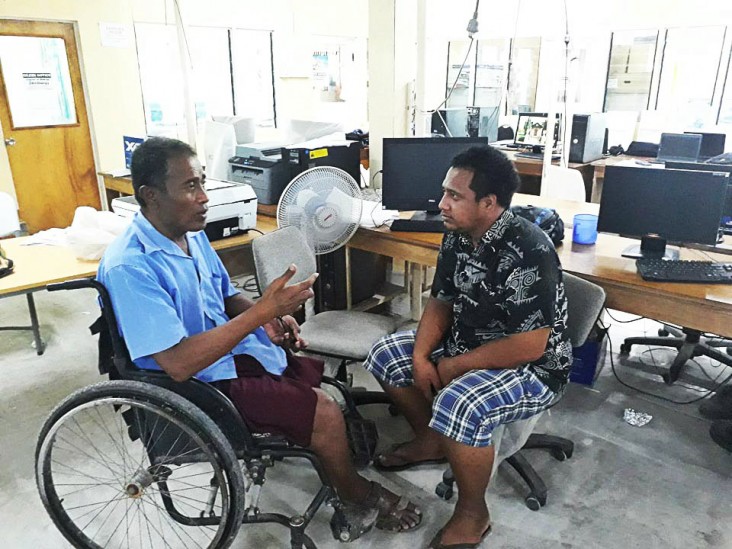Speeches Shim

November 2017—The Republic of Kiribati is a tiny Pacific Island nation located along the equator. Most of the country’s 33 islands stand just a few meters above the sea, leaving its population of 105,000 people vulnerable to rising sea levels and severe weather.
“Imagine washed out roads, lack of fresh water, and tropical cyclones with extraordinary strength,” says Toam Iabeta, who lives in Beito, part of the country’s capital island of Tarawa. “Now imagine going through this if you are a person with a disability.”
Iabeta uses a wheelchair. Most of his friends have fled the eroding shorelines and rebuilt their homes on higher ground. But it is difficult for people with disabilities to move and adapt on their own, says Iabeta.
Through his work with the Ministry of Infrastructure and Sustainable Energy, Iabeta also knows that the country needs more lasting solutions—other than constantly relocating and rebuilding—to take control of its unpredictable future.
Earlier this year, USAID partnered with the University of the South Pacific to deliver a five-month management course for Iabeta and about 30 other representatives from the government, civil society and the private sector who are working on disaster resilience projects in Kiribati.
Through this accredited course, participants learned about risk assessment, human resources, and business communications to help them maximize funding and manage their projects to benefit more people, especially vulnerable populations.
During the course, Iabeta advocated for equal access to health, education, water and other basic services in both rural and urban areas. He stressed the importance of safeguarding people with disabilities during emergencies, and of applying universal accessibility standards when reconstructing public spaces and homes where people with mobility disabilities live.
“Often, people with disabilities find themselves left aside while others receive attention in planning disaster risk reduction activities,” says Iabeta. But when their strengths and vulnerabilities are represented, he says, whole communities are made more resilient.
Iabeta has since been managing major government projects, such as the construction of a causeway as well as water and sanitation programs. While these were underway before Iabeta started his training, he now manages them more effectively and can better oversee their successful completion.
“I feel more empowered,” he says about encouraging others to engage people with disabilities for a more inclusive perspective.
Meanwhile, the Government of Kiribati has committed funding to enable more people to attend this course and to earn a diploma at the university.
USAID’s Ready project is rolling out the course across 12 Pacific Island countries, where more than 400 people, including people with disabilities, are harnessing their skills and resources to lead their communities to a more resilient future. With strengthened management skills, they are better equipped to achieve results that attract more international funding and make their work more sustainable.
The five-year project trains governments and institutions to develop and implement environmental and disaster mitigation policies and strategies. The project works in Fiji, Kiribati, Nauru, Tonga, the Federated States of Micronesia, Nauru, Palau, Papua New Guinea, the Republic of the Marshall Islands, Samoa, Solomon Islands, Tuvalu and Vanuatu.
LINKS
Follow on Facebook

Comment
Make a general inquiry or suggest an improvement.